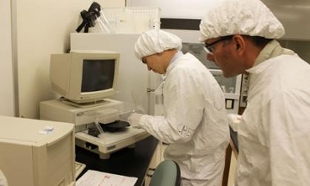Can small grants really enable academic excellence, innovation?
News
When JMU senior Chet Szwejkowski starts graduate school at the University of Virginia in the fall, he won’t be a new kid on the block. In fact, he will be a veteran of at least one of the research projects he will work on there.
For the past year, Szwejkowski has been researching ways to remedy heating issues in gallium-nitride-based transistors. The research is being done as a collaboration between the laboratories of Dr. Costel Constantin, assistant professor of physics and astronomy at JMU, and Dr. Patrick Hopkins, assistant professor of mechanical and aerospace engineering at U.Va.
"I have been able to work on some really cool projects that I was interested in and it was just really great being able to go to U.Va. and experience all the resources over there," Szwejkowski said.
Szwejkowski's research opportunity received a significant boost from a $20,000 scale-up grant from the 4-VA consortium. The presidents of JMU, George Mason University, University of Virginia and Virginia Tech organized the consortium in 2010 in an effort to foster collaboration and to meet the educational and business needs of Virginia. Scale-up grants are awarded periodically to faculty who have an established research agenda, have an established partnership in the research, can demonstrate promise and past progress and are about to launch a proposal for an externally-funded grant. U.Va. matched the $20,000 and since receiving the scale-up grant in February 2013, Constantin and Hopkins have also received a $200,000 grant from the Commonwealth Research Commercialization Fund. They are planning on seeking additional funding to keep the encouraging research going.
"The beauty of these startup grants is they fund some really exciting ideas and give us the ability to go after other avenues of funding," said Hopkins. "We were also able to recruit Chet to come join our lab at U.Va. for grad school. So I think on every avenue it was a complete and utter success."
Exposing JMU undergraduates to graduate work was one of Constantin's main goals for seeking the grant money. "Chet could see what it means to be a graduate student. I think it is inspiring," Constantin said. JMU physics major Nicole Creange will join the research this summer.
Szwejkowski has used a number of high-tech techniques, such as atomic force microscopy and time-domain thermoreflectance at JMU and U.Va. while working on his part of the project that is exploring ways to make heat transfer across gallium nitride (GaN) interfaces more efficient. He has mastered preparation and characterization techniques for gold-gallium nitride samples and he observed clear relationships between roughness at the gold-gallium nitride interface and the thermal properties. Finding a solution to the heating issues would be particularly valuable for LEDs (light emitting diodes) and for high-power devices such as radar systems, radio frequency transistors, transmitting power systems and communication systems, including those used by the military.
"GaN is an ideal material to use, but the problem is the interfaces that come in contact with GaN cause huge thermal resistance and thermal loads that cause large temperature changes," Hopkins said. "So what you want to do is take that interface and make it more conductive. You want to suck heat across that interface more efficiently and that's what we've been working on. The process that JMU has been developing to create these interfaces is something we've made leaps and bounds on."
The additional grant money has helped purchase more equipment, which will give students in the collaboration more opportunities to work on projects beginning this summer. An especially exciting project will be the construction of a new laser-based system to map the temperature changes and thermal properties around hot spots in GaN devices.
"We're really excited about this because this will give our students the unique opportunity to really build laser systems with which we can measure thermal properties of materials," Constantin said.

